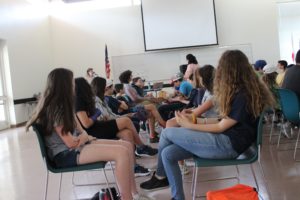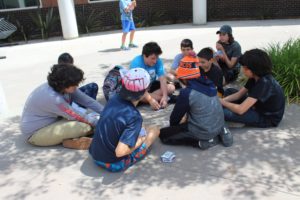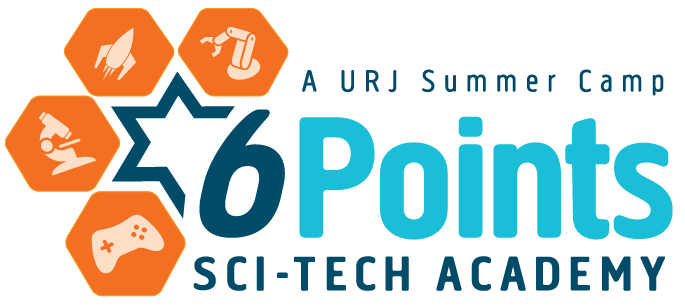“What are the forces, rules, or powers that cause the universe to act the way it does?”
This was the prompt that launched one of our “J-lab” sessions at the URJ 6 Points Sci-Tech Academy – West last week. It was a prompt that catalyzed conversations and questions about God for campers from ages 8 to 15, and a chance for me, as a visiting rabbi and faculty member, to be inspired by the way that science and Judaism interact at our movement’s newest camp.
“Gravity!” one camper called out. “Electro-magnetism! Quarks! Matter and physics and chemical interactions!” A group brainstorm turned into a personal reflection, chances to share as a team, and start to explore aspects of our personal theologies in meaningful ways.

Campers were offered tools of language and freedom to start thinking about God in new ways: God as one of those forces in the universe that helps shape its course; God as hatov v’hameitiv, the Good and the One who Makes for Goodness; God as Creator and Fashioner of the natural world and the properties that fascinate and excite them. Campers shared their hope that God’s existence could fuel more hope and kindness in the world, and their stark fear that God and religion have been historically and culturally used as weapons, and tools of hatred. And most importantly, our campers left this exercise with a new metaphor for their expanding universe of theological questions. Just as the perimeter of a circle, filled with “all we know,” would continually have a greater surface area to encounter “all we don’t know” as it expands, so too can our understanding of God continually grow along with the growth of all that we wonder about, struggle with, and question.
Beautifully, that was only one hour of the full and busy week I shared with the community at sci-tech west. The camp program allows for science and Judaism to be integrated in meaningful ways each and every day, from exploring how to teach Judaism to nearby aliens, to programming video games or robots that connect with ideas of tikkun olam, repairing the world.

At the end of the week, the Camp Director Jordanna Flores asked me to teach one of my own melodies, a setting for Eliyahu Hanavi that expresses our partnership with God in building the world for which we hope and wait. It was an honor to share this melody with camp, of course, and to teach the idea that the messianic era will not just begin with Elijah the prophet showing up on horseback, but begins with us working together to build a world where we can use our powers of reason and our love of nature and science to be partners with God in preserving and perfecting ourselves and our world. But more than the honor of sharing this idea, I left camp after Havdalah full with the values that the campers and their passion for science and technology had taught me: newfound curiosity about the world around me, a deeper commitment to patience & perseverance for experiments that do not always go right the first time, a renewed passion for innovation, a refreshing model of a summer home that practices radical acceptance (treating every human as the refelction of the Divine image), and a pride in our Jewish heritage and the ways our Reform Movement has helped it grow, adapt, and connect to our modern world.
Blessed are you Eternal One, Ruling in all Space and Time, who gives us a world to explore, questions to ask, and a community with which to share them.
Rabbi Max Chaiken serves as the Assistant Rabbi at Congegation Kol Ami in West Hollywood, CA.
